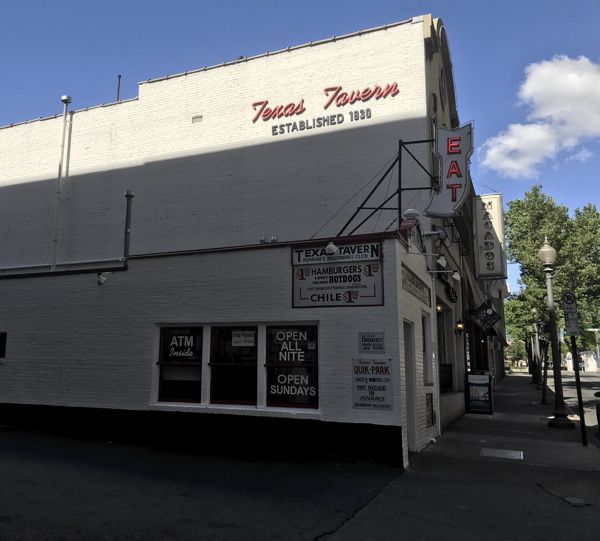Texas Tavern:

Texas Tavern in Roanoke, Virginia.
A Call for Slow Writing, by Lindsay Waters:
In A Call for Slow Writing, Lindsay Waters says:
It’s time for journal essays to replace books as the dominant mode of scholarly communication
In academia, there are lofty demands for getting tenure–demands mostly centered on publication. The form of what is published depends on the field–in engineering, you’ll want quite a few journal papers and conference papers; in the humanities, you’ll want a number of books. As the executive editor for the humanities at the Harvard University Press, Waters here is concerned about the humanities, and the overproduction of poorly written books hastily produced to beat the tenure clock:
Words suffer under the whip of such a taskmaster. –Lindsay Waters
His solution is to return to the essay “as the standard in humanistic writing.” But his underlying point is to write better–to hold academics up to higher standards of quality writing–thus the slow writing call in the title of his essay.
On that main point I would agree–most academic writing is jargon-filled, poorly constructed, and not readable. It’s a style of academese written to satisfy a counting metric by departments and tenure committees. As Waters describes a book proposal he received:
the views in the proposal were those manufactured by others and the linking of them in the proposal had no coherence, and the problem was manifest in the clumsy writing. – Lindsay Waters
Is slow writing the answer? An answer, perhaps. All I know is that it’s something I’m working on.
Time for Reading, by Lindsay Waters:
In Time for Reading, Lindsay Waters wants to start a new movement.
Waters, executive editor for the humanities at Harvard University Press, in theory knows a few things about words. In Time for Reading he wants us to pay more attention to them. Not emojis, not texts, not lol. But real words assembled together to create lush tapestries that transport us to other place, times, and realms of thinking.
I want to ask what reading would look like if we were to reintroduce, forcefully, the matter of time. Let’s leave Evelyn Wood behind, and let’s leave Franco Moretti behind, too. The mighty imperative is to speed everything up, but there might be some advantage in slowing things down. People are trying slow eating. Why not slow reading? – Lindsay Waters
Reading is fundamental to writing, to living, to learning. I’ve encountered people in high school and college who, after graduation, were looking forward to never having to read another book. That makes me sad. Waters has a point in his article, but from my point of view, whether you read fast or slow, just read.